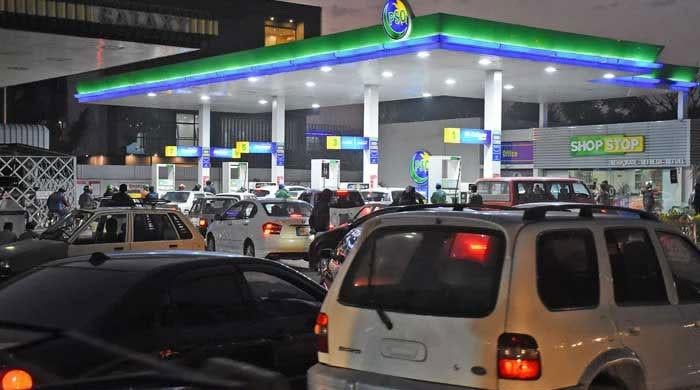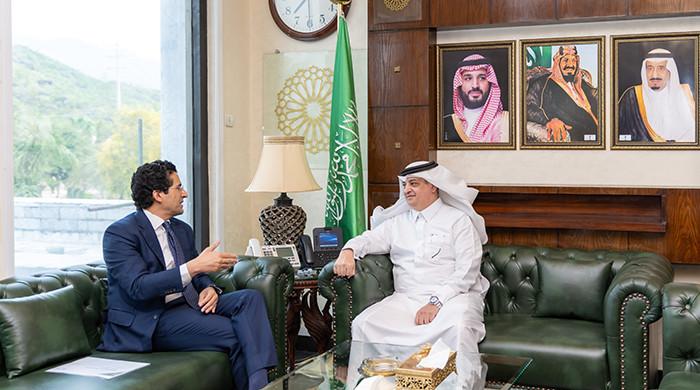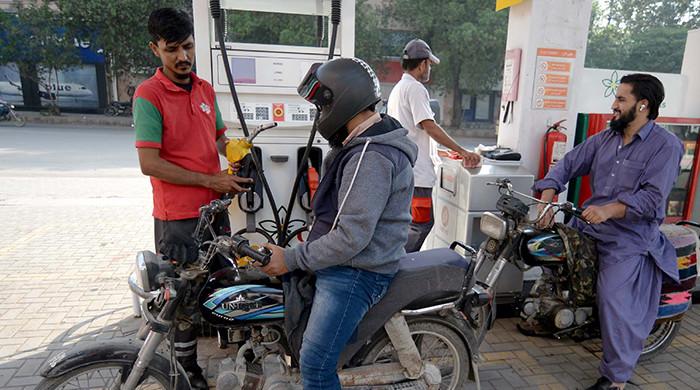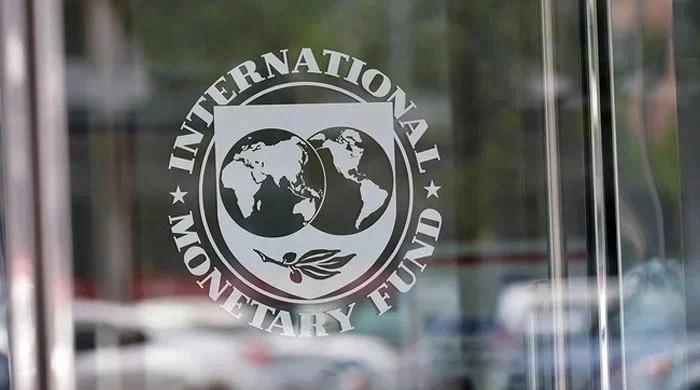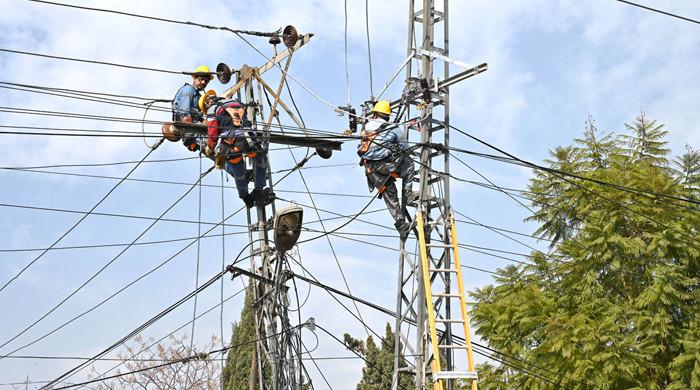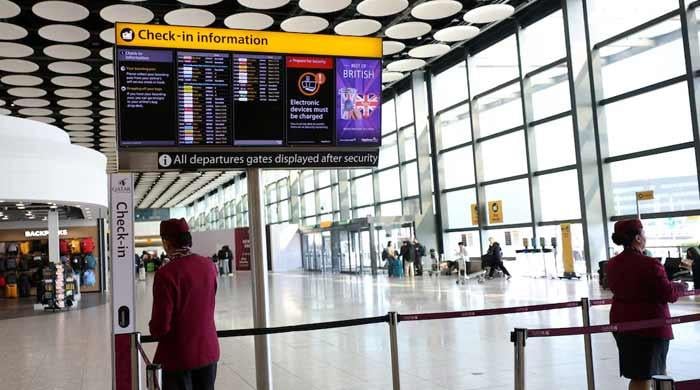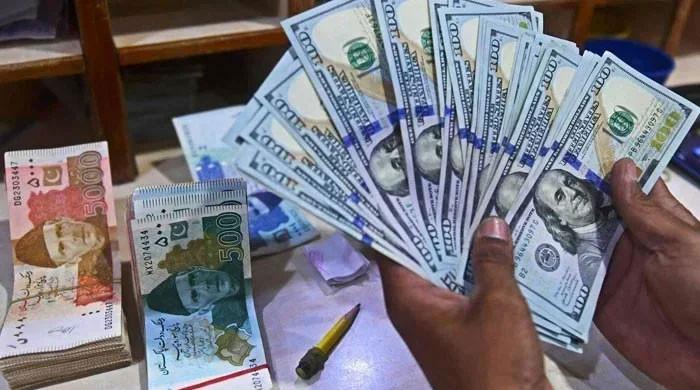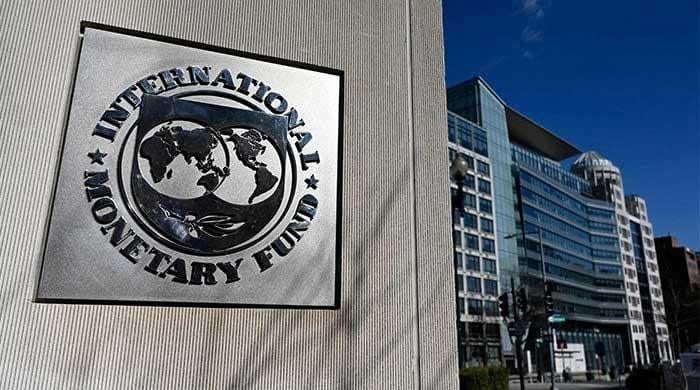Economy moving in right direction, primary objective is to ensure sustainable stability: Aurangzeb
Govt made “significant progress” toward achieving macroeconomic stability, says finance minister
November 03, 2025
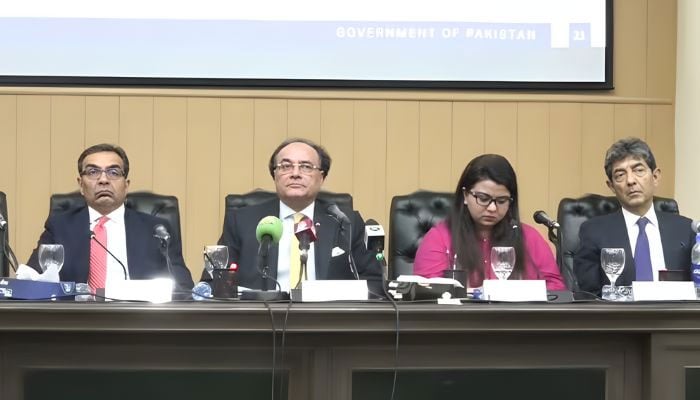
- Govt planning no new taxes, says FBR chairman.
- Energy minister says electricity price cut by 10.5%.
- Govt accelerates privatisation drive; PIA process underway.
ISLAMABAD: Finance Minister Muhammad Aurangzeb has said that Pakistan's economy is moving in the right direction with “visible signs” of improvement across key sectors.
Addressing a presser alongside the government's economic team on Monday, Aurangzeb said the government has made “significant progress” toward achieving macroeconomic stability, adding that the staff-level agreement recently reached with the International Monetary Fund (IMF) validates Pakistan's economic recovery efforts.
He said that the government's primary objective is to ensure sustainable economic stability through structural reforms. “Fundamental reforms in the tax system, energy sector, and other key areas are essential for long-term growth,” the minister said.
The finance minister said that pension reforms and right-sizing are also part of the fundamental reforms. He reiterated the government's commitment to implementing its reform agenda to strengthen the economy and maintain fiscal discipline.
Aurangzeb added that three global rating agencies have confirmed Pakistan's macroeconomic stability. He also expressed gratitude to the Gulf Cooperation Council, China, and the United States for helping Pakistan.
‘Govt targets 18% tax-to-GDP ratio in coming years’
Federal Board of Revenue (FBR) Chairman Rashid Langrial said Pakistan's tax-to-GDP ratio has increased by 1.5% for the first time. He said that the rate of filing individual income tax returns has also increased this year, with the number of taxpayers rising to 5.9 million.
He said that income tax filings saw an 18% jump compared to the previous year.
The FBR chairman said that the government aims to raise its tax-to-GDP ratio to 18% in the coming years, adding that comprehensive tax reforms cannot be achieved within a single year.
He said that there is no immediate need for the imposition of new taxes by the FBR, stressing instead the importance of improving tax compliance and broadening the tax base to strengthen revenue collection.
‘Govt will no longer purchase electricity’
Energy Minister Awais Leghari said the government is organising the energy sector on modern lines and that wherever an opportunity arose, every possible effort was made to provide relief to the public.
He said in the past 18 months, the price of electricity was reduced by up to 10.5%, the EV rate was reduced from Rs71 to Rs39, and technical issues resolved in the energy sector achieved savings of billions of rupees.
He added that the task force on independent power producers (IPPs) has done notable work, circular debt was reduced by Rs700 billion in one year, and a loan agreement of Rs1,200 billion was concluded to reduce circular debt.
Leghari said the government will no longer purchase electricity, automated metering is being introduced with prepaid options for consumers, and the entire electricity system will be on automated metering in the next three years.
‘Privatisation process will be accelerated’
Adviser to the Prime Minister on Privatisation Muhammad Ali said the government is ensuring transparency in the privatisation process and enhancing the capacity of the Privatisation Commission.
He said the pace of the privatisation process will accelerate in the coming period, noting that First Women Bank was sold for Rs5 billion.
He added that the UAE company that bought First Women Bank has now entered Pakistan. On the national airline, he said the first phase of the transaction could not be completed, and that there are now four consortiums for the privatisation of the national airline.
He said the groups coming forward for privatisation are those with vast experience, and that efforts are being made to complete the privatisation of the national airline before the end of the year.
The aim is for a business group to acquire the national airline that will make major investments in it, he added. He said financial experts are being engaged, the government is determined to achieve its targets related to privatisation, and the process of privatising DISCOs has begun with IESCO, LESCO and FESCO.
'54,000 vacant posts abolished after right-sizing'
For his part, Coordinator to the Prime Minister for the Right-Sizing Salman Ahmad said final approval for the right-sizing of any department is given by the cabinet, and consultation with the relevant ministries is being ensured during the process.
He said 20 ministries have undergone right-sizing and 54,000 vacant posts have been abolished.
Ahmad said PASSCO is an institution running at a heavy loss and will be shut down. He added that the taxpayers' money should not be wasted and an attempt has been made to maintain, with profitable institutions or departments allowed to continue operations.
He said out of 39 ministries, 20 are running 301 departments, and work is ongoing in 9 of the remaining 19 ministries, which oversee 78 institutions.
'Cashless economy'
Federal Minister for Information Technology and Telecommunication Shaza Fatima said the PM had formed three committees on the cashless economy and we are moving towards a cashless economy.
She said the roadmap of Digital Nation Pakistan is being implemented and the Digital Nation Pakistan Act was approved in January this year. She added digitalisation plays a key role in expanding the tax net and increasing collections, all government institutions will work together on the digital exchange layer, and the Raast payment system will make digital transactions easier.
She said people will no longer be able to conceal their transactions and under digitalisation, all national institutions will be harmonised.




